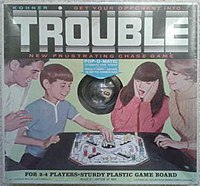Trouble (board game)
 |
|
| Players | 2–4 |
|---|---|
| Age range | family |
| Setup time | 1 minutes |
| Playing time | ~30 minutes |
| Random chance | High (dice) |
Trouble (known as Frustration in the UK and Kimble in Finland) is a board game in which players compete to be the first to send four pieces all the way around a board. Pieces are moved according to the roll of a die. Trouble was developed by the Kohner Brothers and initially manufactured by Irwin Toy Ltd., later by Milton Bradley (now part of Hasbro). The game was launched in the United States in 1965. It is very similar to the much older game, Mensch ärgere dich nicht, as well as another Hasbro game, Sorry! (originally marketed by Parker Brothers). The classic version is now marketed by Winning Moves. All these games are versions of the classic Indian game Pachisi, which was first introduced to the western world in England under the name of "Ludo".
A similar game called Headache was also produced by the Milton Bradley Company.
Players can send opponents' pieces back to the start by landing on them. Players may not touch the other player's piece, otherwise the piece's owner must redo the pop/roll. Teaming is not allowed in the game. Pieces are protected from capture after arriving in the final four slots. Unlike more complex race games, however, counters cannot be maneuvered to block opponents' moves.
The most notable feature of Trouble is the "Pop-O-Matic" die container. This device is a clear plastic hemisphere containing the die, placed over a flexible sheet. Players roll the die by pressing down quickly on the bubble, which flexes the sheet and causes the die to tumble upon its rebound. The Pop-O-Matic container produces a sound when it is used, and prevents the die from being lost (and players from cheating by improper rolling). It allows for quick die rolls, and players' turns can be performed in rapid succession. The die is imprinted with Arabic numerals rather than the traditional circular pips (though the circular pips are used in the Travel version, which contains a cover to keep the pegs from being lost).
...
Wikipedia
